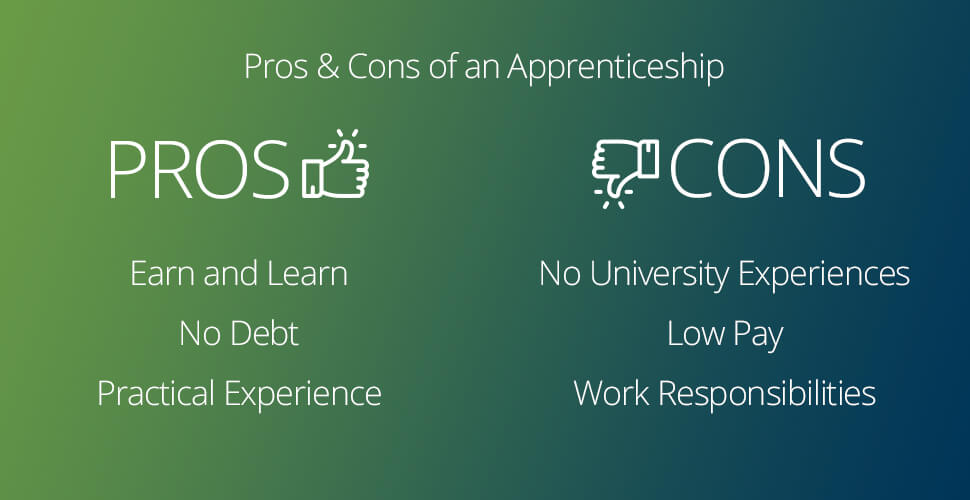JobsTrackR has long been dedicated to helping jobseekers find their dream job. Acting as both an independent jobs board and a career advisor, JobsTrackR…
Is an apprenticeship right for me? Why choose an apprenticeship over education or a full-time job? If you are looking for what to do for your next step and you’d like to know a bit more about apprenticeships, here is some career guidance that could help you decide if it’s the right option for you.
What is an apprenticeship?
An apprenticeship is where you work and learn at the same time. You essentially gain a qualification whilst getting paid to work. So, if education alone isn’t your cup of tea, then an apprenticeship could be perfect for you.
Who is an apprenticeship for?
Everyone mistakenly thinks that apprenticeships are only for 16-year-old school leavers. Truth be told, apprenticeships are open to anyone over the age of 16. Subject to your qualifications, you will be allowed to apply for certain apprenticeship levels.
Are there different levels of apprenticeships?
Different apprenticeships typically have different entry requirements and varying levels of qualifications; these may vary depending on your employer or training provider.
Intermediate apprenticeship
This level is great for anyone that is starting out and doesn’t have many qualifications. If you don’t have GCSE’S in maths and English you will be required to take a test.
Intermediate Apprentices work towards Level 2 qualifications, NVQ Level 2, Key Skills and, in most cases, a relevant knowledge-based qualification such as a BTEC.
Advanced apprenticeships
If you’ve got two A-levels or more, you might want to jump straight into applying for the advanced level. You will be studying towards a level 3 qualification.
Higher apprenticeships
If you have five GCSEs (grade A*-C), then this level is better for you because you can gain a higher qualification. If you go for a level 4 and 5 apprenticeship you will gain a qualification equivalent to a higher education certificate, higher education diploma or a foundation degree. The Level 6 option will gain you a qualification equivalent to a bachelor degree.
What is the pay like?
As an apprentice in the UK, you’re entitled to the National Minimum Wage.
Currently, the minimum wage rate for an apprentice is £3.50 per hour. This rate applies to apprentices under 19 and those aged 19 or over who are in their first year. You must be paid at least the minimum wage rate if you’re an apprentice aged 19 or over and have completed your first year.
Your pay might vary depending on the company you will be working for and each one will be different. Some companies might even cover extra expenses such as travel costs.
You are also entitled to at least 20 days paid holiday per year, plus bank holidays.
What type of apprenticeship should I do?
This is often a harder task to think about. You might already have in mind which type of apprenticeship you want to do, however, finding it might be a bit more difficult than you think. See below a list of resources to some websites you can use to search for current apprenticeships.
If you have an idea that you just want to earn and learn, and you don’t know what apprenticeship you would like to do, think about what skills you have and things that you enjoy and base your search on that.
TOP TIP – Don’t rush into finding an apprenticeship. Go to as many interviews as possible and really get a feel for the company as well as the job you will be doing.
What happens after the apprenticeship?
Gaining a qualification as well as the work experience is one of the main benefits of an apprenticeship. Nevertheless, the employer may keep you on after the apprenticeship and offer you a permanent position which means you gain a full-time job. The likelihood that you will get kept on may depend on whether you do well and you become invested in the job role and prove your worth.

Pros and cons of an apprenticeship
If you still haven’t made up your mind, here are some pros and cons about apprenticeships:
Pros
- Earn and Learn – This is one of the biggest benefit to an apprenticeship. If you can’t wait to start earning a salary, then this would be more appropriate than university;
- No Debt – This speaks volumes. University is expensive especially if you don’t really know what you want to do;
- Practical experience – Learning on the job gives you an advantage because you have had first-hand experience gaining practical skills that can help your future career prospects.
Cons
- No university experiences – You may see your friends having a different life and experiences to you because they go to university;
- Low pay – Even though you do get paid, some people may think the pay is too low, although this is only temporary;
- Work responsibilities – Whilst working as an apprentice you may feel like you have a big workload. An apprenticeship is still technically a full-time job.


